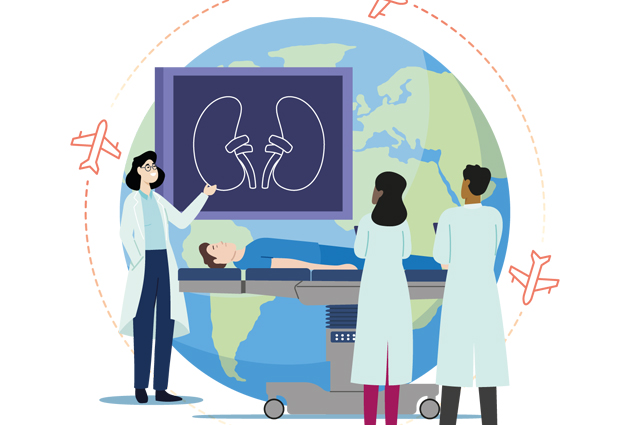Deceased Donor Kidney Discard, the Tight-knit Nephrology Community and Paying it Forward: Sumit Mohan on his Career Path to Award-Winning Research

Dr. Sumit Mohan, deputy editor of Kidney International Reports, is a professor of medicine and epidemiology at Columbia University. His research findings have helped improve access to kidney transplants and positively impacted public policies for patients with kidney disease.
In recognition of these achievements, Dr. Mohan received the National Kidney Foundation (NFK) Excellence in Transplantation Award earlier this year and has since been honored with the Clinical Science Investigator Award from the American Society of Transplantation.
We spoke to Dr. Mohan about his involvement with the ISN and the far-reaching influence of his work:
- What question or challenge were you setting out to address when you started your research work?
My primary interest is improving access to care, reducing disparities, and improving outcomes for patients with kidney disease. This involves understanding the factors that contribute to existing disparities so we can inform changes in public health policy as well as develop interventions to reduce disparities and improve outcomes.
- What are the possible real-world applications of your research?
Our work focuses on improving care for patients with kidney disease. In kidney transplantation, our research has identified the inappropriate decline and discard of deceased donor kidneys as a significant impediment to kidney transplantation access. This has included identifying several phenomena for the first time in transplantation, such as the weekend effect and unilateral discards. In addition, we have identified opportunities for improving organ allocation in the United States and challenges with assessing the quality of organs available for transplantation.
- What is your greatest career accomplishment, either locally or globally (or both!)
We have raised concerns about the challenges of the inappropriate discard of deceased donor organs with findings that have resonated with kidney professionals and patients in the United States and globally. Our work has conclusively established that kidney discards are avoidable in many instances and are caused by the inappropriate selectivity on the part of transplant centers when evaluating deceased donor organs. The increased attention to improving organ utilization has informed health policy at multiple levels, been cited by the federal government in multiple instances, and led directly to a national learning collaborative focused on increasing the number of kidney transplants performed annually.
- Can you identify any particular mentors or colleagues who influenced your career path?
Jen-Tse Cheng introduced nephrology to me – and was my first mentor and the person to whom I owe much of my clinical training. Nephrology is a small, tight-knit community; I am fortunate to have had relationships with many people who have been very generous with their time and advice over the years, both at Columbia University and elsewhere.
- What difference has your involvement with the ISN made in your career?
I grew up and did my early medical training in India but completed my clinical and research training in the United States, where I currently work. I have always wanted a career that would allow me to contribute to the field in a manner that would benefit patients on a global scale – especially disadvantaged patients. The ISN, and in particular my role at KI Reports, has allowed me to meaningfully pay it forward by creating a platform that welcomes research from LMIC nephrologists. The ISN has helped me build relationships with nephrologists outside the United States that have led to important ongoing collaborations.
- What do you feel has been your main contribution to the ISN during your affiliation?
With Jai Radhakrishnan, we started KI Reports from scratch to build an open-access journal for the field, aiming to become the go-to journal for clinical nephrology for clinicians worldwide. The rapid growth of the journal, as reflected by the increasing number of submissions and the high quality of work that we see published at KI Reports, has been a rewarding experience.
- What contribution have you made to kidney care that is most meaningful to you?
I would like to believe that we are just getting started in terms of building towards making meaningful contributions to the field. In addition to improving access to care and outcomes for patients with the most severe forms of kidney disease, I hope to pay it forward as a mentor to other clinical researchers in the field. A robust pipeline of younger nephrologists is essential for continued innovation and advancement to benefit patients with kidney disease.
The ISN congratulates Dr. Mohan on his outstanding achievements and looks forward to continuing to benefit from his valued contribution to advancing global kidney care.










